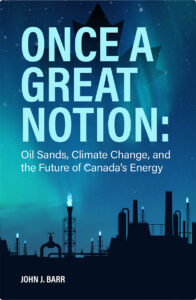SHOULD THE OIL SANDS “JUST BE LEFT IN THE GROUND?”
A LETTER TO LEONARDO DiCAPRIO, ACTOR, ENVIRONMENTALIST AND OIL SANDS CRITIC
Dear Mr. DiCaprio,
We have not met, so allow me to introduce myself and explain why I am writing to you.
In August, 2014 you flew to northern Alberta and spoke out about the Oil Sands’ contribution to global warming. In order to prevent a global climate crisis, you said, the oil sands should “just be left in the ground.”
Because you said it, and because you are one of the world’s best-known environmental activists, this idea gained considerable support from some educated people in North America and Europe. That is why I am writing to you now.
“Leaving the Oil Sands in the ground” is a deceptively simple solution to saving the climate. Because, to quote H.L. Mencken, “for every complex problem there is an answer that is clear, simple, and wrong.”
Let me explain…

I have addressed the vivid and contentious debates around the oil sands in a new book entitled Once A Great Notion: The Oil Sands, Climate Change, and the Future of Canadian Energy. It investigates the origins, birth, growth – and contentious future – of the resource and the people. I am sending you a copy today, with respect.
There are two reasons why “leaving the oil sands in the ground” is not a workable solution to the challenge of greenhouse gas emissions.
The principal reason is that, because energy systems are so deeply rooted in our world, it isn’t politically, technically or economically feasible. A call to simply leave the oil sands in the ground is as noble, and futile, and has as much chance of succeeding, as a call for unilateral disarmament.
More importantly, even if it were possible to stop the production of oil from the oil sands in the very near future, it would make no difference to the Earth’s climate. Why? Because the people who consume fossil fuels – which is pretty much everyone — would simply buy fossil fuels from alternate suppliers of whom there are many….countries like Russia, Saudi Arabia, Iran and others.
The problem is that people everywhere are hungry for energy, for the very good reason that it powers improved living standards. And their hunger is growing.
We’re all in this together. Not just the most advanced countries but all the developing countries, who realize that energy is the key to improved living standards. Which is why China and India continue to ramp up their production and combustion of coal, in the face of all promises.
Charley Brown put it best. As far as energy consumption is concerned, he said, “we have met the enemy and it is us.”
My second reason for writing you is that “leaving the oil sands in the ground” would deflect attention from the task – already underway – of reducing CO2 emissions by means that make technical, economic and political sense. Innovative energy technologies – including the capture and sequestration of oil sands emissions, and the development of new carbon-based products like graphene and carbon fibre – will do more to shrink the “carbon footprint” of the oil sands than idealistic but unworkable concepts like “leaving it in the ground.”
People in the oil sands industry are working on those solutions now. Instead of calling for the industry to be abolished (which is what “leave it in the ground” logically suggests), people in the industry should be encouraged to redouble their efforts.
I am sending you a copy of Once A Great Notion in the hope that it will shed light on aspects of the “Oil Sands debate” and the need for all of us to work together in finding pragmatic means to prevent climate damage.
Sincerely,
John J. Barr


